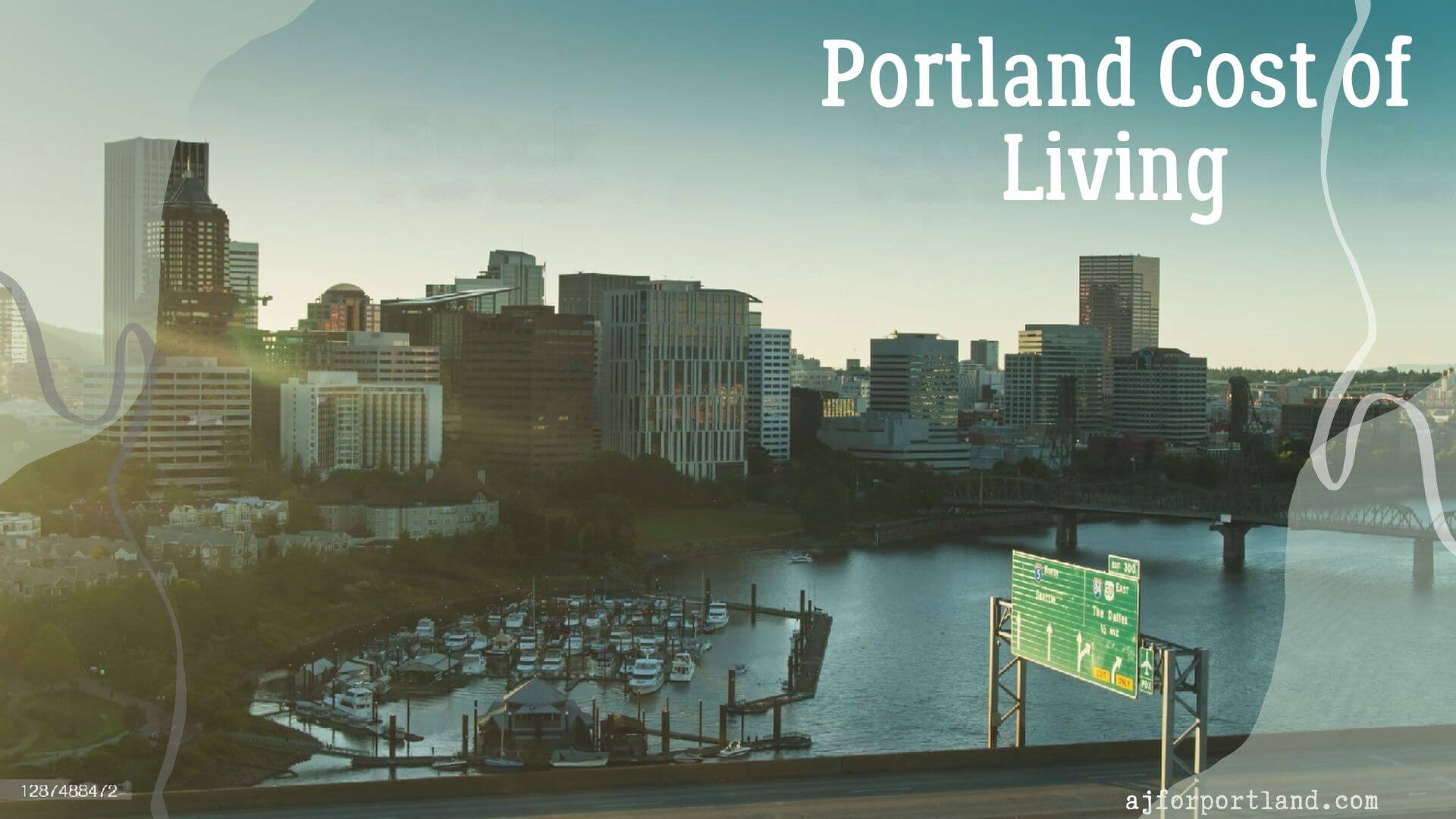Portland, Oregon has been growing in popularity in recent years, with its vibrant culture, scenic beauty, and booming job market attracting people from all over the country. However, with this increase in popularity has come a rise in the cost of living. In this article, we’ll take a closer look at the real cost of living in Portland and break down the expenses of daily life in this city. From housing to transportation to food and utilities, we’ll give you a comprehensive guide to the costs you can expect to encounter if you’re considering a move to Portland.
Housing Costs in Portland, Oregon
Housing costs in Portland, Oregon can vary widely depending on the neighborhood, type of housing, and other factors. According to Zillow, the median home value in Portland is $526,500 as of September 2021, up 15.7% over the past year. The median rent for a one-bedroom apartment is $1,468, while a two-bedroom apartment rents for an average of $1,893 per month.
In more desirable neighborhoods such as the Pearl District or Hawthorne, housing costs can be even higher, with some homes selling for over $1 million. However, there are also more affordable neighborhoods throughout the city, such as Montavilla or Brentwood-Darlington, where housing costs are more moderate.
If you’re considering buying a home in Portland, keep in mind that the city has a competitive real estate market with low inventory and high demand. It’s important to work with a qualified real estate agent and be prepared to act quickly if you find a home you like.
Overall, while housing costs in Portland may be higher than some other cities in the region, the city offers a wide range of neighborhoods and housing options to suit different budgets and lifestyles.
Utilities and Transportation Costs in Portland, Oregon
Utilities and transportation costs in Portland, Oregon can vary depending on factors such as the size of your household, your location, and your lifestyle. Here are some average costs to keep in mind:
Utilities:
- Electricity: The average monthly electric bill in Portland is around $83, but this can vary widely depending on the size of your home and your energy usage habits.
- Water and sewer: The average monthly bill for water and sewer in Portland is around $70.
- Gas: The average monthly gas bill in Portland is around $42.
Transportation:
- Public transportation: TriMet, the public transportation system in Portland, offers a range of options including buses, light rail, and streetcars. A one-way fare on TriMet is $2.50, while a day pass is $5.
- Gasoline: The average price of gasoline in Portland is around $3.30 per gallon.
- Car insurance: The average annual cost of car insurance in Oregon is around $740.
Utilities and transportation costs in Portland are generally in line with other cities of similar size and demographics. By taking advantage of public transportation options and making energy-efficient choices at home, it’s possible to keep these costs manageable.
Food and Grocery Costs in Portland, Oregon
Food and grocery costs in Portland, Oregon can vary depending on factors such as your dietary preferences, where you shop, and how often you eat out. Here are some average costs to keep in mind:
Groceries:
- According to Numbeo, the average cost of groceries for one person in Portland is around $350 per month.
- Popular grocery stores in Portland include New Seasons Market, Whole Foods, and Trader Joe’s.
Eating Out:
- The cost of eating out in Portland can vary widely depending on the type of restaurant and the neighborhood. According to Budget Your Trip, the average cost of a meal at a mid-range restaurant in Portland is around $20.
- Portland is known for its food carts, which offer a wide variety of cuisines at affordable prices. A meal at a food cart typically costs between $5-$10.
Beverages:
- The cost of beverages in Portland can also vary depending on your preferences. A cup of coffee typically costs between $2-$4, while a pint of beer at a bar can range from $5-$7.
While Portland does have some higher-end restaurants and grocery stores, there are also plenty of options for affordable and budget-friendly meals. By taking advantage of local farmers markets and food carts, as well as cooking at home, it’s possible to keep food and grocery costs manageable in Portland.
Health Care and Education Costs in Portland, Oregon
Healthcare and education costs in Portland, Oregon can vary depending on factors such as your age, income, and health insurance coverage. Here are some average costs to keep in mind:
Healthcare:
- According to a 2020 report from the Oregon Health Authority, the average monthly premium for individual health insurance plans in Oregon was around $456.
- If you’re uninsured or underinsured, there are several community health clinics throughout Portland that offer low-cost or free healthcare services.
Education:
- Portland is home to several well-regarded universities, including Portland State University, Reed College, and the University of Portland. Tuition costs at these institutions can vary widely depending on the program and level of study.
- The Portland Public School District serves over 50,000 students and includes several highly-ranked public schools, as well as several private schools. The cost of private school tuition in Portland can vary widely, with some schools charging over $20,000 per year.
While healthcare and education costs in Portland can be high, there are also many resources available for low-income and uninsured individuals. It’s important to research your options and take advantage of community resources and financial aid programs where possible.
Managing the Cost of Living in Portland, Oregon: Tips and Strategies
Portland, Oregon is a desirable place to live, but it can also be expensive. Here are some tips and strategies for managing the cost of living in Portland:
- Housing: Consider living in more affordable neighborhoods or sharing housing with roommates to reduce costs. It may also be worth exploring options like house sitting or subletting to save on rent.
- Transportation: Take advantage of Portland’s public transportation system, which offers a range of affordable options. Consider biking or walking to reduce costs further.
- Food: Shop at local farmers markets and food co-ops to save on groceries, and limit eating out to special occasions. Take advantage of Portland’s many food carts for affordable and tasty meals.
- Utilities: Use energy-efficient appliances and light bulbs to reduce your electricity bill, and consider taking shorter showers and fixing leaks to save on water bills.
- Healthcare: Research healthcare options to find affordable care, including community health clinics and low-cost insurance plans.
- Education: Explore scholarship and financial aid options for education, and consider attending a more affordable college or university.
- Lifestyle: Be mindful of unnecessary spending and prioritize experiences and activities that are low-cost or free.
By being strategic and proactive in managing expenses, it is possible to live comfortably and affordably in Portland.
The Bottom Line
Portland, Oregon is a popular destination for people looking for a vibrant city with a diverse range of cultural and recreational opportunities. However, the cost of living in Portland can be relatively high compared to some other cities in the region. Housing costs in Portland have been rising in recent years, with the median home value currently around $526,500. The cost of rent in Portland also tends to be higher than the national average, with the average rent for a one-bedroom apartment around $1,468 per month. Additionally, utilities and transportation costs can also add up, with the average monthly electric bill around $83 and a one-way fare on public transportation costing $2.50. Despite these costs, many people find that the benefits of living in Portland outweigh the expenses. Portland also tends to be cheaper to live in than its neighboring city of Seattle, with a lower overall cost of living index. While the cost of living in Portland may be high, there are also many affordable housing and food options throughout the city.


